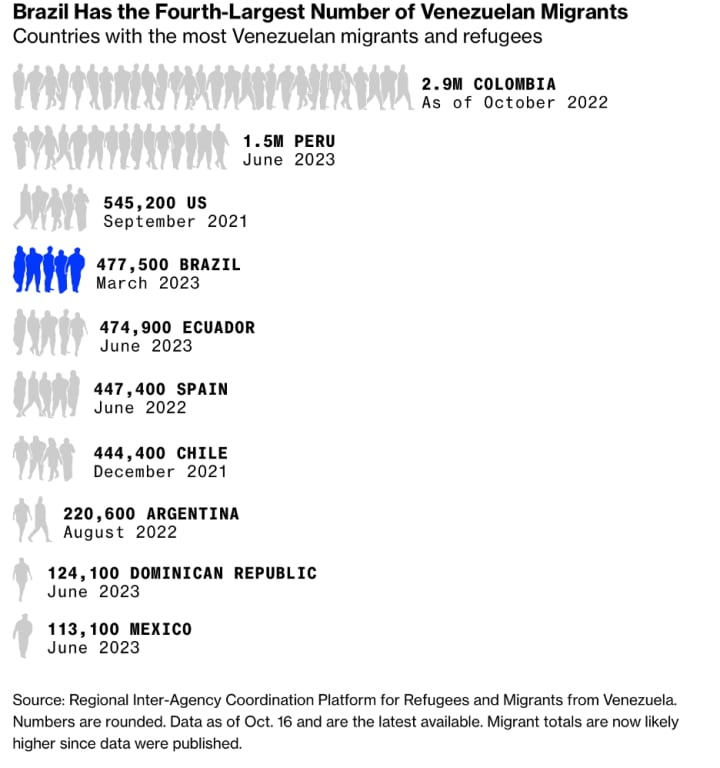How to Effectively Moderate Immigration Flows into the United States
An Unbiased Perspective

One will not accomplish this goal by telling future asylum seekers that coming to the United States is not a good idea. Instead, the best way to achieve this goal would be to tell the truth and provide realistic opportunities to those making the long trek. It will not happen by relocating these immigrants from red states to blue states, where governments put immigrants in hotels and take care of these families for up to 6 months before they can legally secure work visas.
Instead, we should take a lesson from what Latin America is doing with the 7.7 million Venezuelans who have decided to leave their country in search of a better economic landscape. Brazil has opted not to pit one state against others with immigration flows. Instead, the central government has relocated and integrated hundreds of thousands of immigrants into jobs/industries that local workers refuse to work in. The country has also continued to absorb about 2,000 asylum seekers each month. Most jobs have been in the farm industry and meat processing plants. These are demanding jobs, but until the country can fully automate these jobs, Brazil has opted to relocate these immigrants thousands of miles to areas with acute job shortages. The result is making Brazil more competitive in these job sectors.

Other smaller economies relative to the U.S., like Mexico, Chile, Argentina, Peru, Columbia, Ecuador, and the Dominican Republic, have also absorbed scores of Venezuelan asylum seekers into their economies. One European country, Spain, representing the fastest-growing economy within the Eurozone, has already absorbed about 450,000 Venezuelan immigrants! Spain is expected to grow its real GDP by 2.4% in 2023, which is on par with expected U.S. real GDP growth.
Many of these workers have complained that these are demanding jobs but readily admit that they represent better opportunities than they have back home. By word of mouth, others back home won’t just hear from the host governments telling them not to make the trek but rather will hear directly from those working in such countries describe the dire working conditions and low wages they are receiving. That will be the best incentive to moderate immigration flows, given that the messages will come directly from credible sources.
Giving these individuals immediate access to employment instead of aid will also ease the financial burdens of these cities and states experiencing rapid inflows of immigrants. In the U.S., we have severe shortages in the Leisure and Hospitality sector and many other industries. Allowing these immigrants who choose to come to the United States voluntarily an opportunity to work in these types of jobs is better than the alternative of adversely impacting the finances of state and local governments. Besides, if these immigrants feel exploited at any point, they can always voluntarily choose to return to their country. This is not a serfdom arrangement; they are free to return home anytime.
Most immigrants fully understand, as my parents, who were both immigrants, knew that short-term sacrifice to help the next generation (of which I am a product) often do better than the first generation. My mother cleaned office buildings, and my dad worked as a waiter in Chinese restaurants for long hours at menial wages. My mother often said she was given a larger workload than others, and my dad was often forced to work 7 days a week to support our family. My dad always said, “The beautiful thing about the U.S. is that it offers economic opportunities, even if they are not attractive, but never forces anyone to stay working under such conditions!” Such hard work may be why my father died of a stroke at the age of 46 when I was just 10 years old! It was a tough life, but my mother reminded me after his death that my dad always understood that his sacrifices were made to help the next generation.
Summary and Concluding Thoughts
In a world of scarce resources and economic hardship, distributing the fruits of economic prosperity fairly and equitably has always been challenging as we strive to honor our capitalistic ideals. We have often been reminded that capitalism can be cruel to some and kind to others. However, it motivates some individuals to travel for weeks through dangerous jungles to expose themselves to severe health risks and risk of bodily harm in search of a better economic future. So why not be honest and offer individuals a shot at the American dream, even if it means such dreams will only be realized after many years of struggle?
Sadly, we can’t offer anyone a shortcut to those ideals because it will be unfair to existing residents and distort the decision-making of future immigrants. But let's consider giving them a fair shot with the jobs that go unfilled and undesired by U.S. workers with the understanding that this will be temporary for those who are ambitious and find a way to succeed within our system.
But in the end, it boils down to two simple philosophical views. Why not provide immigrants with the same opportunity many previous immigrant generations had when they first came to our country? In contrast, others will ask: Why is it our responsibility to help others in need when we already have many pressing domestic needs? I hope that our readers will be able to decide which position to support.
About the Creator
Anthony Chan
Chan Economics LLC, Public Speaker
Chief Global Economist & Public Speaker JPM Chase ('94-'19).
Senior Economist Barclays ('91-'94)
Economist, NY Federal Reserve ('89-'91)
Econ. Prof. (Univ. of Dayton, '86-'89)
Ph.D. Economics






Comments (1)
💚📝😁👍